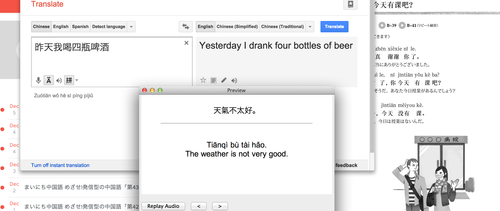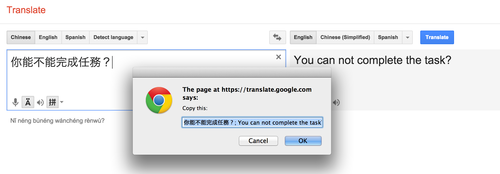How I Learn Chinese

I started learning Chinese a couple of months ago now. The motivation was obviously seeing Mark Zuckerberg giving his talk in Chinese in Beijing, and just thought I would be able to do that as well.
Plus as a frequent traveler to Taiwan, I always wanted to learn the language, although with enough Kanji knowledge as a regular Japanese I had been able to spend my time without any Chinese knowledge at all.
My learning method is solely focused on spaced repetition using the excellent (but a bit clunky UI) Anki app.
- The textbook is NHK まいにち中国語
- The books are on Kindle
- I use ripdiru to rip the stream. Also available on iTunes Store as an audiobook, but it is DRM protected.
- Ripped audio files are imported to Audacity and I literally rip them apart to make small chunk of audio samples.
- Import the audio, along with expression (kanji), meaning (in English) and pin-yin into Anki using txt import. The textbook is for Mandarin, and the text is in Simplified Chinese, but for my own purpose, I enter the Anki cards in Traditional Chinese text.
Ripping the audio is the most tedious part, but Audacity’s label and bulk export tool makes it a little less so.

Entering pin-yin on a computer is possible with the US extended keyboard on OS X, but it’s painful to do so manually. Fortunately, Google Translate provides a nice javascript-based pin-yin input and that shows the final pin-yin nicely in an HTML output.
You could copy them manually into Anki add box, but it’s easier by grabbing them in one shot:
javascript:void(window.prompt(‘Copy this:’,
document.getElementById(“source”).value + “; “
- document.getElementById(“result_box”).innerText + “; “
- document.getElementById(“src-translit”).innerText))

</figure>
(Yep, I know Google Translate’s translation above is not correct. I use google as an extended input method, not a translator)
NHK’s lessons are easy to follow, but sometimes a bit boring. The conversation samples are often uninspiring and targeted to old listeners in Japan. I started looking around TEDxTaipei and some other presentations that provide audio along with the complete transcript, as a next step. They are most of the times more interesting to hear, but too fast for me to make any sense at all, yet.
Hopefully in my next trip to Taiwan in 2015 I can make more conversation with local people in Chinese. Actually, I could try a bit in San Francisco Chinatown as well, but most of the old people there speak Cantonese, which is completely different from Mandarin so far as I know.